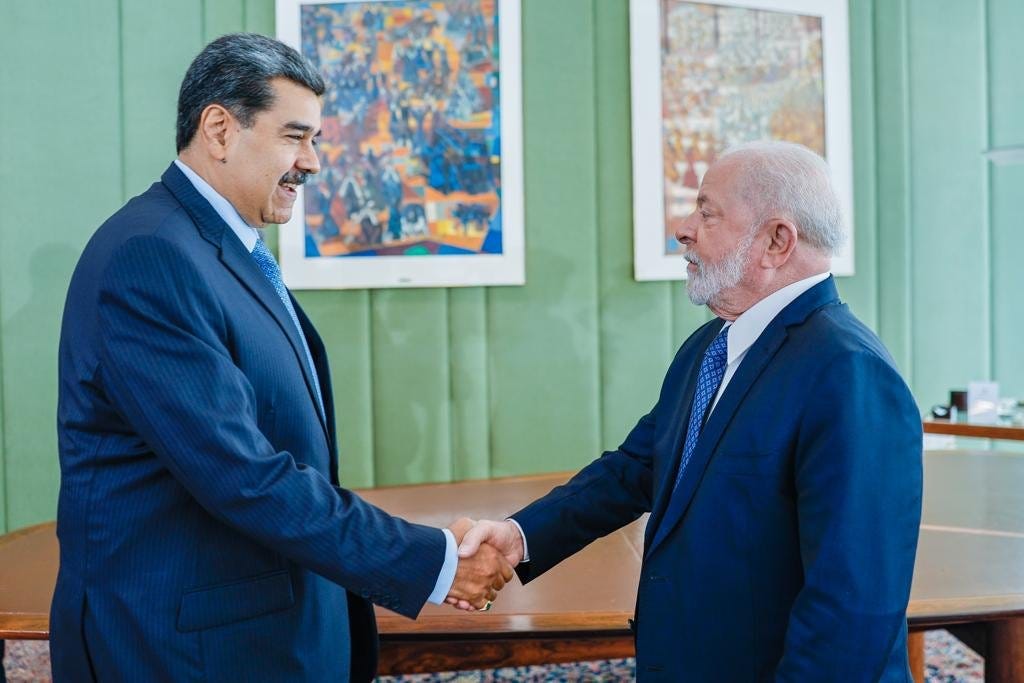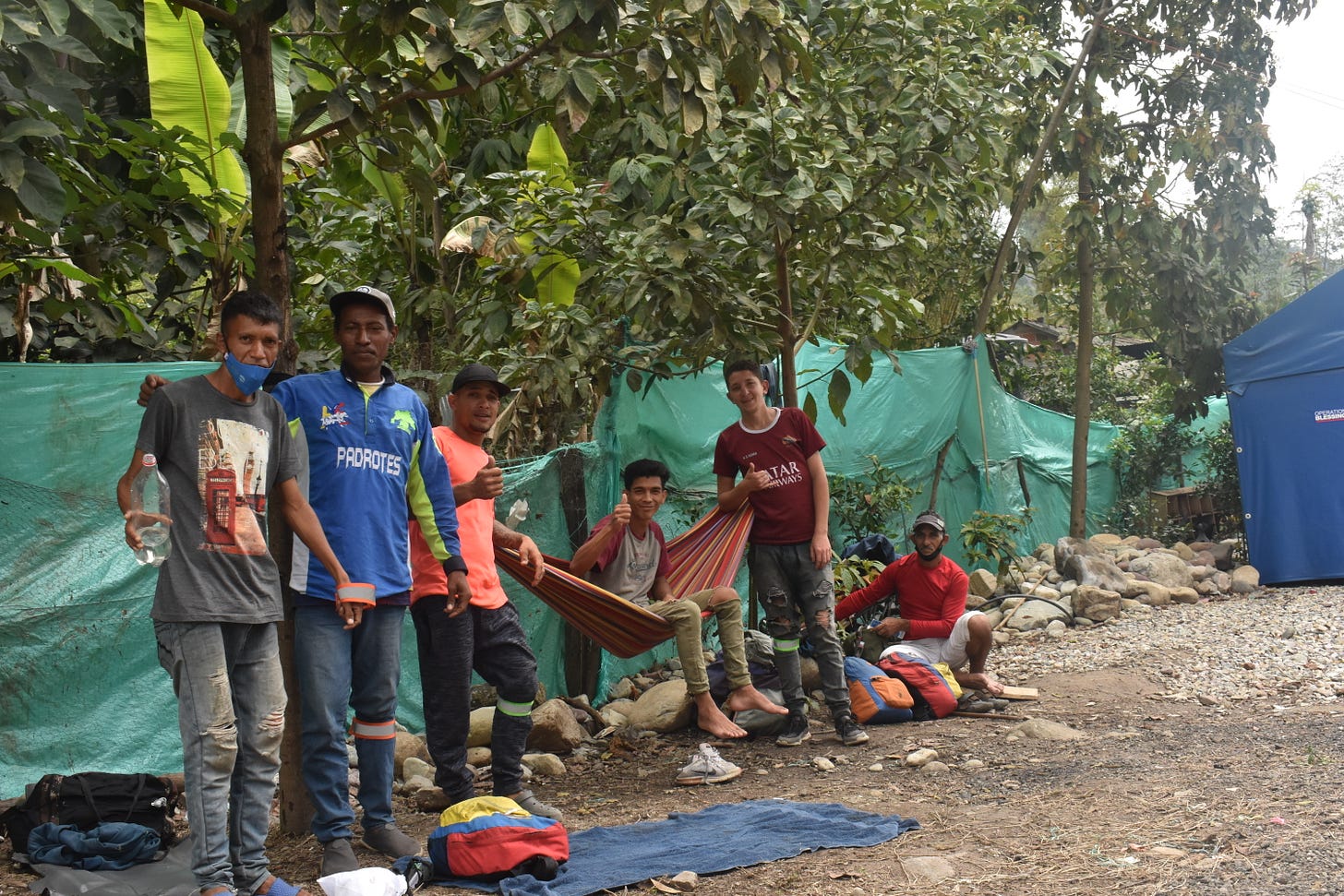LATAM Conference illustrates consensus on Venezuela: isolation hasn't worked
Brazil's Lula criticized for Maduro comments, but even critics acknowledge previous policy has failed— and hurt Venezuela's neighbors
Hello piratas! Welcome back!
We are happy to announce, for one week only, a 20% discount on upgrading to a paid subscription at Pirate Wire Services! That means you can upgrade for just $4/month.
Not only will you be supporting a burgeoning small independent media collective bringing direct journalist-to-reader content to your inbox, you will also get access to our “Ship’s Logs”— more personal analysis and insight on the beats we have covered as professional freelance journalists for years.
El Capytán needs your support! And if you are already a subscriber, we thank you from the bottom of our piratical hearts. You make our coverage possible, and for that we are deeply grateful.
LATAM Conference illustrates consensus on Venezuela: isolation hasn't worked
Brazil's Lula criticized for Maduro comments, but even critics acknowledge previous policy has hurt Venezuela's neighbors

For the first time in 9 years, presidents and representatives from 12 South American countries gathered in Brazil for a summit on Tuesday, at the invitation of Brazilian President Luiz Inacio Lula da Silva, as part of his efforts to revive the regional bloc previously known as the Union of South American Nations, or UNASUR.
The international reunion generated headlines and criticism over Lula’s warm reception of Venezuelan President Nícolas Maduro. But the summit also illustrated a harsh reality: the regional consensus among Latin American countries is that efforts to isolate and destabilize the autocratic government of Maduro have failed— the president has emerged from years of sanctions more secure in his power than at arguably any point in his ten-year rule.
Lula’s unnecessary apologetics
At a dual press conference with his Venezuelan counterpart, Lula told reporters that there exists a “very large” prejudice against the country and that the stories of an “anti-democratic” Venezuela are a “narrative” promoted by the wealthy Western countries whose sanctions have exacerbated Venezuela’s economic and humanitarian crisis.
Human Rights groups sharply criticized the comments, as did longtime critics of both Maduro and Lula. Venezuela has been accused of thousands of extrajudicial executions, crackdowns on opposition activists and protesters, and election irregularities, as well as a host of other human rights abuses currently under investigation at the International Criminal Court.
Lula’s comments that these serious abuses are merely a “narrative” also prompted sharp rebukes from leftist Chilean President Gabriel Boric as well as right-wing President Luis Lacalle Pou, from Uruguay.
“It isn’t a narrative,” Boric said at a press pool immediately after Lula’s comments, “It is a reality that I have seen for myself. Human rights need to be respected everywhere…regardless of ideology.”
But what Boric said afterward, in that same interview, illustrates a broad emerging consensus across Latin America, and one that has even entered the corridors of Washington D.C.

Isolating Maduro didn’t work and it actively harmed Venezuela’s neighbors, as well as migrants
The regional policy employed since 2019 of attempting to remove Maduro from power via international sanctions and attempts to make him a global pariah has utterly failed.
“Sanctions do not weaken the rulers, they harm the people", explained Boric. “We call on the United States and the European Union to lift the sanctions to allow the Venezuelan people to move forward," he said.
Boric’s Chile, unlike Brazil and Colombia, doesn’t share a border with Venezuela, or he might have spoken about how a lack of diplomatic relations and officially closed borders as part of an isolation strategy carried out by former presidents Ivan Duque in Colombia, and Jair Bolsonaro in Brazil didn’t just fail to destabilize Maduro, they destabilized Brazil and Colombia — and got a lot of people killed in the process.
But I can indeed speak to that. I lived and worked on the Colombian-Venezuelan border at the height of the Venezuelan exodus between 2018 and 2020. Almost 8 million Venezuelans have now fled their country as economic and political crises rocked the nation.
At the height of that exodus, thousands left daily, principally westwards, into Colombia and points beyond, but also south into Brazil. And closed borders resulted in an explosion of criminal activity and a bloody shadow war as criminal groups battled for the right to exploit that mass human movement.
And it was a shadow war that caught residents of the borderlands, as well as millions of migrants, in the crossfire.

Chaos in the Borderlands can’t be solved unilaterally
Colombia shares a 2219 km border with Venezuela (1378 miles). Brazil’s shared frontier measures 2850 km (1770 miles). The vast majority of those borderlands, in all three countries, are effectively lawless and largely exist outside the control of any central government.
An inability for even basic communication between those governments exacerbated long-standing dynamics and resulted in an explosion of smuggling, not just of humans, but also of goods both legal and illegal.
Forced recruitment by criminal groups is common, as is sexual exploitation of vulnerable Venezuelan migrants, extortion, massacres, bombings, targeted killings, and even armed confrontations.
State security forces from all three countries have also been implicated in these activities.
For years, this region at its most chaotic was my principal news beat, one that I lived daily. And it was one whose vicious bleakness left a deep impact on me (for more on that specifically, you can read this piece for PWS).
I have often found it curious that critics of Maduro often use those who flee Venezuela as a political cudgel to argue that hard-line measures are needed, but they are strangely silent about the effects an isolationist policy has on those humans actually crossing the borders.
The most charitable interpretation of this, shall we say discrepancy, is that they aren’t familiar with borderland dynamics. A less forgiving interpretation is that many of those pundits don’t care about those forced to flee— merely geopolitical ends.
Gustavo Petro in Colombia has been criticized for normalizing relations with Venezuela, but aside from whatever other problems this might bring, it is unquestionably better for locals near the border, as well as for migrants.
All of this is to say, Lula’s comments on the autocratic government of Maduro merit criticism, but if a reduction in human suffering in Venezuela and beyond is really the goal of critics, a political approach that begins to address spreading chaos in the borderlands must be welcomed. It is simple pragmatism.
The world vastly underestimated Maduro in 2019, and Venezuela’s regional neighbors suffered as a result. We welcome Petro and Lula’s pragmatism on borders. We just hope that Lula specifically can engage in harm reduction without cheerleading authoritarianism.

The Big Headlines in LATAM
Dina Boluarte declined to attend Lula’s regional summit, instead sending a surrogate. She claimed her inability to travel was due to a lack of a Vice President, making it unclear who would rule in her absence.
However, many experts told PWS that it is because she faces an ongoing criminal investigation over her role in the killing of protesters early this year. A new report this week from Amnesty International demanded further investigations into Peruvian security forces as well as “institutional racism” among their ranks.
Also at the conference, Lula called for a regional South American currency, one that would replace the U.S. dollar and facilitate intra-regional trade.
Argentina eased access to “morning after” pills via legislation which now allows
“over-the-counter” purchases. Health groups as well as women’s rights groups hailed the decision as “removing an important barrier” in contraceptive care. The majority Catholic country in 2020 legalized abortions up to the 14th week of pregnancy
What we’re writing
Joshua this week explained for World Politics Review how the first leftist president in the country’s modern history, Gustavo Petro, seems to have hit a wall politically. Despite a promising start, his approval ratings are flagging, his agenda is stalled in Congress, and he is growing increasingly combative with both critics and the press.
If you register for free at WPR, you can bypass the paywall and read why.
For El Pais, Daniela wrote about the inclusion of three feminist directors at the Cannes festival, and why that is so important for Colombian Women.
“Colombia's presence at Cannes is purely feminine”. With 'La Perra' and 'Amor, Mujeres y Flores', the country participates in the 76th edition of one of the most important film festivals in the world. (Original in Spanish).
Spanish Word of the Week
Chuzada- Colombian slang for being stabbed, or phone interceptions, depending on the context.
This week’s word was suggested to us on Twitter by one of our readers, “Mel”, and has been all over the headlines here. The story merits an entire article really, but the basics are that a powerful Colombian politician (possibly illegally) detained a domestic worker in her employ, took her to a basement, and forced her to respond on a polygraph test to accusations she had robbed her employer.
As the scandal spread, it came to light that Colombian Intelligence had also bugged her phone without a warrant— she had been Chuzada.
In this context, luckily, that didn’t mean she had been stabbed. But there is no doubt she was grossly mistreated by those with power.
Maybe we can explain the whole story next week, until then, here is a Spanish-language piece on the case.
Regardless of the context, you don’t want to ever be Chuzada by Colombian police.
Thanks as always for reading. Hasta pronto, piratas!



